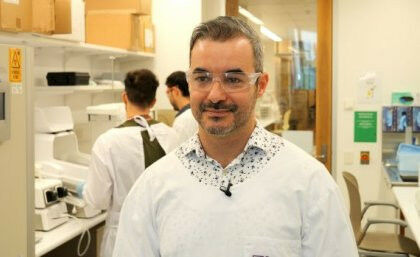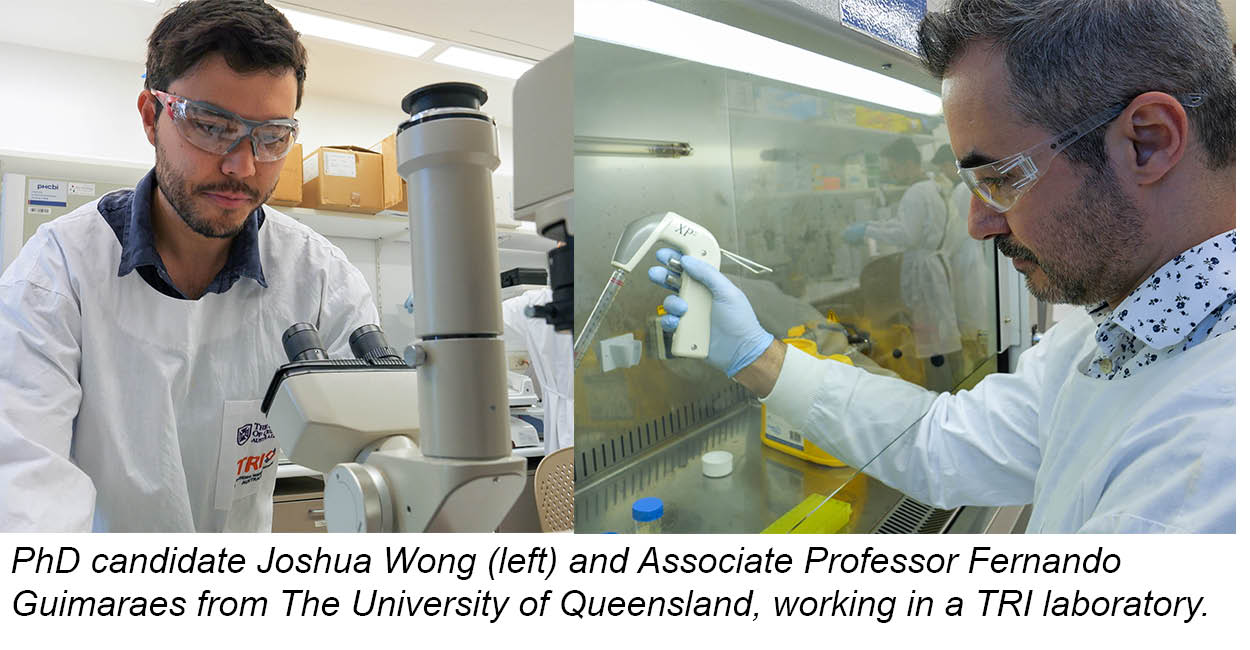博文
膀胱癌潜在的新治疗途径
||
膀胱癌潜在的新治疗途径
诸平

Associate Professor Fernando Guimaraes from UQ’s Frazer Institute. Image: TRI
据澳大利亚昆士兰大学(University of Queensland简称UQ, Woolloongabba, QLD, Australia)2024年8月21日提供的消息,该校研究人员发现了膀胱癌潜在的新治疗途径(Potential new treatment pathway for bladder cancer)。
昆士兰大学的一项研究可能会带来一种更有效的膀胱癌免疫疗法。由昆士兰大学弗雷泽研究所(UQ’s Frazer Institute)的费尔南多·吉马拉良斯(Fernando Guimaraes)副教授领导的研究小组,发现了膀胱癌抑制免疫系统自然杀伤 (natural killer简称NK) 细胞的机制。
费尔南多·吉马拉良斯博士说:“我们发现癌症通过释放一种叫做TGF-β的蛋白质来抑制免疫细胞,阻断这种蛋白质可能为一些最严重的癌症提供一种新的治疗方法。
NK细胞是免疫系统的组成部分,自然攻击癌细胞,是新兴癌症治疗的焦点,包括基于抗体的免疫疗法。
我们的研究也是迈向临床试验的一步,以探索TGF-b抑制剂与NK细胞治疗相结合的有效性。我们的工作就是释放免疫疗法的力量,我们希望这能在3到5年内带来新的膀胱癌治疗方法。”
膀胱癌是世界上第九大最常见的恶性肿瘤——2023年,澳大利亚有3000多人被诊断出患有膀胱癌,其中1000多人死亡。膀胱癌免疫抑制机制是费尔南多·吉马拉良斯的博士候选人Joshua Wong在昆士兰转化研究所(Queensland’s Translational Research Institute简称TRI)工作时发现的。
Joshua Wong说:“这真的是一个灵光一现的时刻,每天来到这里,尽自己最大的努力,这是一种极大的激励,因为最终我们是在努力找到治愈癌症的方法。”
早期膀胱癌的标准治疗仍然是内窥镜手术(endoscopic surgery),偶尔结合化疗或免疫治疗。
对于膀胱癌的晚期形式,更有侵入性的手术或放疗与化疗或免疫疗法相结合,这与严重的健康不良和对生活质量的终身影响有关。
昆士兰大学团队与亚历山德拉公主医院(Princess Alexandra Hospital)的泌尿科医生合作,包括Handoo Rhee博士、Eric Chung教授(Professor Eric Chung)和Alice Nicol博士。参与此项研究的除了来自澳大利亚昆士兰大学的研究人员之外、还有来自澳大利亚昆士兰网络基础设施基金会有限公司(Queensland Cyber Infrastructure Foundation Ltd, Brisbane, Australia)以及澳大利亚亚历山德拉公主医院和伊丽莎白二世银禧医院(Princess Alexandra Hospital and Queen Elizabeth Jubilee II Hospital, Woolloongabba, QLD, Australia)的研究人员。原文详见:Joshua K M Wong, Timothy R McCulloch, Louisa Alim, Natacha Omer, Ahmed M Mehdi, Zewen Kelvin Tuong, Alexis Bonfim-Melo, Eric Chung, Alice Nicol, Fiona Simpson, Handoo Rhee, Gustavo Rodrigues Rossi, Fernando Souza-Fonseca-Guimaraes. TGF-β signalling limits effector function capacity of NK cell anti-tumour immunity in human bladder cancer. eBioMedicine, 2024 Jun: 104: 105176. DOI: 10.1016/j.ebiom.2024.105176. Published online 2024 May 28.
本研究中费尔南多·吉马拉良斯实验室得到了美国国防部-乳腺癌研究计划-突破奖1级资助{US Department of Defense-Breast Cancer Research Program-Breakthrough Award Level 1 (#BC200025)},在昆士兰儿童医院基金会(Queensland Children's Hospital Foundation)、Microba生命科学(Microba Life Sciences)、里奇彩虹基金会(Richie's Rainbow Foundation)、转化研究所(Translational Research Institute简称TRI)和昆士兰大学(UQ)的支持下,通过医学研究未来基金(Medical Research Future Fund简称MRFF)授予资助(#2019485),以及Metro South健康研究支持计划的资助 (#RSS_2023_085)。另外还有昆士兰大学研究培训计划博士奖学金(UQ Research Training Program PhD Scholarship)以及NHMRC研究生奖学金资助{ NHMRC Postgraduate Scholarship (#2021932)}。
上述介绍,仅供参考。欲了解更多信息,敬请注意浏览原文或者相关报道。
Bladder cancer discovery leads to potential new treatment pathway
Background: Natural killer (NK) cells are important innate immunity players and have unique abilities to recognize and eliminate cancer cells, particularly in settings of antibody-opsonization and antibody-dependant cellular cytotoxicity (ADCC). However, NK cell-based responses in bladder cancers to therapeutic antibodies are typically immunosuppressed, and these immunosuppressive mechanisms are largely unknown.
Methods: Single cell RNA sequencing (scRNA-seq) and high-dimensional flow cytometry were used to investigate the phenotype of tumour-infiltrating NK cells in patients with bladder cancer. Further, in vitro, and in vivo models of this disease were used to validate these findings.
Findings: NK cells within bladder tumours displayed reduced expression of FcγRIIIa/CD16, the critical Fc receptor involved in ADCC-mediated cytotoxicity, on both transcriptional and protein levels. Transcriptional signatures of transforming growth factor (TGF)-β-signalling, a pleiotropic cytokine known for its immunosuppressive and tissue residency-inducing effects, were upregulated in tumour-infiltrating NK cells. TGF-β mediated CD16 downregulation on NK cells, was further validated in vitro, which was accompanied by a transition into a tissue residency phenotype. This CD16 downregulation was also abrogated by TGF-βR signalling inhibition, which could also restore the ADCC ability of NK cells subject to TGF-β effects. In a humanized mouse model of bladder cancer, mice treated with a TGF-β inhibitor exhibited increased ADCC activity compared to mice treated only with antibodies.
Interpretation: This study highlights how TGF-β-rich bladder cancers inhibit NK cell-mediated ADCC by downregulating CD16. TGF-β inhibition represents new avenues to reverse immunosuppression and enhance the tumoricidal capacity of NK cells in bladder cancer.
https://blog.sciencenet.cn/blog-212210-1447754.html
上一篇:独特的植物物种为癌症提供了令人惊讶的新见解
下一篇:下一个前沿:DNA成为数据存储和计算的引擎
